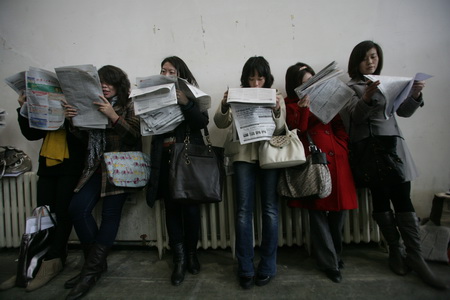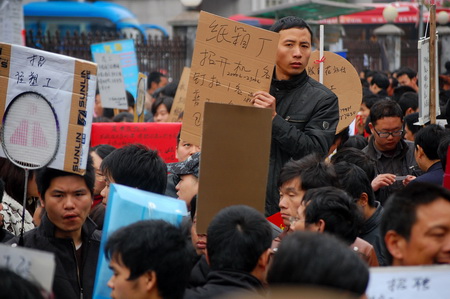Economy
Workers falling through skills gap
By Daniel Chinoy and Wang Xiaotian (China Daily)
Updated: 2010-03-05 06:56
 |
Large Medium Small |
As nation battles to reduce unemployment, analysts say it is shortage of skilled workers, not jobs, that is causing problems. Daniel Chinoy and Wang Xiaotian report from Beijing.
Song Yongliang did everything right. He worked hard, went to college and majored in Russian, which he thought would be practical in his hometown in Northeast China.
In his senior year, he found an internship as a translator and hoped to find a job with a trading company near the Russian border after he graduated in 2008. Then the financial crisis hit.
Trading companies cut back on hiring and, for a graduate with minimal experience, Song's prospects looked grim, forcing him to take whatever jobs he could find. He worked as a translator in Beidaihe, a seaside town in Hebei province, and on Hainan Island, and even spent a brief, unhappy period at a relative's alcohol factory in Shandong province.
Frustrated but unbowed, the 28-year-old eventually made his way to Beijing, where he found work as a salesman and then a recruiter for a private school. The pay was meager, the hours were long, and as time went on, it became more difficult to hide his disappointment.
"I went to college, spent all that money, and yet you can make more money working as a security guard or a waiter here," he said.
"I definitely thought about it. My parents would have lived more comfortably and I would have lived easier. But it would have been a huge loss of face, an admission of failure. Did I spend all that time in school preparing to become a security guard? I studied hard for four years and my parents supported me. Do I want to waste that?"
Song's experience highlights what experts say is an increasingly large gap between the kinds of jobs that are available in China and the skills and interests of workers able to fill them.
|
 |
|
Job applicants flip through newspapers searching for employment information at a job fair held at the National Agriculture Exhibition Hall in Beijing late last month. ZOU HONG/FOR CHINA DAILY
|
Although particularly acute for college graduates, the situation extends across the Chinese economy, all the way down to the country's millions of migrant workers. Indeed, some economists argue that the new challenge for Beijing is not a lack of jobs - Song, after all, found at least six - but a lack of jobs that fit the people looking for them.
 |
|
Small factory owners hold handmade posters to attract job seekers at a job market in Yiwu, Zhejiang province. The area is suffering from a labor shortage. XU KANGPING/FOR CHINA DAILY
|
Yet unemployment remains high. The government's official figure of 4.2 percent only counts those who register as unemployed, excluding migrant workers and those who choose not to tell the government. A survey by the Chinese Academy of Social Sciences (CASS) estimated that real unemployment in China was actually closer to 9.4 percent in 2008. (A recent report to the State Council proposed an official national survey that is released to the public. Analysts say it could be approved soon.)
In addition, for the past decade, the number of people of working age has increased about 10 million annually, according to the Organization for Economic Cooperation and Development. That is the equivalent of adding more than the entire population of New York City to the Chinese economy every year.
"There is a pretty clear contradiction in the labor market," said Zhang Juwei, a professor and director of the labor and social security research center at the CASS. "Many businesses can't find workers but, at the same time, many people can't find jobs either."
As this trend has become clearer, the central government has recognized that it is a serious problem, and vowed to find a solution.
In an online chat with netizens on Saturday, Premier Wen Jiabao said: "Every year 150 million migrant workers leave their rural homes to seek jobs in cities, 24 million urban unemployed are waiting for jobs, and the number of university graduates will hit a record high of 6.3 million this year, all adding to the employment pressure."
It is a "very important task" for China to create job opportunities, said Wen, who encouraged graduates to start their own businesses and voiced the hope that the employment situation will be better in 2010.
Employment is likely to be a major topic for discussion at the annual session of the National People's Congress (NPC), the country's legislature, which begins today.
"It will definitely be a hot topic," said Lian Si, a professor at the University of International Business and Economics (UIBE) who authored a book on urban communities of struggling graduates called Ant Tribe. "The government is paying a lot of attention to this problem."

"The employment question looms over virtually all political discussion in China, whether it comes up explicitly or not," said John Delury, associate director of the Center on US-China Relations at the New York-based Asia Society.







